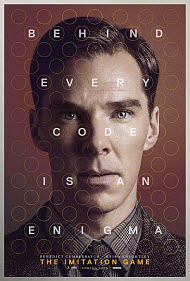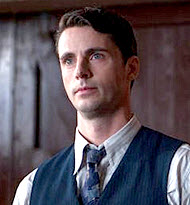The Imitation Game
 for some sexual references, mature thematic material and historical smoking.
for some sexual references, mature thematic material and historical smoking.
Reviewed by: Samuel Chetty
CONTRIBUTOR
| Moral Rating: | Offensive, due to worldview |
| Moviemaking Quality: |
|
| Primary Audience: | Adults |
| Genre: | Biography Thriller Drama |
| Length: | 1 hr. 54 min. |
| Year of Release: | 2014 |
| USA Release: |
November 28, 2014 (limited—4 theaters) December 19, 2014 (34 theaters) December 25, 2014 (wide—747 theaters) January 9, 2015 (1,566) January 30, 2015 (2,402) DVD: March 31, 2015 |







logical thinking and codebreaking using mathematics and mathematicians
importance of perseverance
unsung heros
Alan Turing (Wikipedia biography)

SECULAR HUMANIST WORLDVIEW—What Is It?
Are we living in a moral Stone Age? Answer

GAY—What’s wrong with being gay? Answer
Homosexual behavior versus the Bible: Are people born gay? Does homosexuality harm anyone? Is it anyone’s business? Are homosexual and heterosexual relationships equally valid?
What about gays needs to change? Answer
It may not be what you think.
What does the Bible say about same sex marriages? Answer
Read stories about those who have struggled with homosexuality

SUICIDE—What does the Bible say? Answer
If a Christian commits suicide, will they go to Heaven? Answer
| Featuring |
|---|
|
Benedict Cumberbatch … Alan Turing Keira Knightley … Joan Clarke Matthew Goode … Hugh Alexander Mark Strong … Stewart Menzies Charles Dance … Commander Denniston Allen Leech … John Cairncross Tuppence Middleton … Helen Rory Kinnear … Nock Steven Waddington … Supt Smith Tom Goodman-Hill … Sergeant Staehl Matthew Beard … Peter Hilton See all » |
| Director |
| Morten Tyldum — “Headhunters” (2011) |
| Producer |
|
Black Bear Pictures Bristol Automotive |
| Distributor |
“Behind every code is an Enigma.”
“The Imitation Game” presents the life of Alan Turing, a mathematical genius who worked with the British forces in World War II to develop a machine that could crack the Germans’ cryptography method called Enigma. The movie succeeds in depicting Turing’s work in a way that can engage a wide audience, while remaining relatable to audiences involved with computer science and mathematics. The closing credits include a disclaimer that the movie is not committed to complete historical accuracy, and some elements of the story do seem designed for a movie, but it is a strong film with depth to the personalities of the characters, a suspenseful plot, a musical score that fits the nature of the movie well, and even some humor.
Those who have studied computer science or computational theory will find dialog they can relate to. Turing often describes his machine in terms of everyday life and common-sense problem solving, which makes its technical merit doubtful to many people he encounters. I’m a teaching assistant for a programming class, and we often introduce programming concepts by talking about everyday tasks like cooking or driving. Computer science is primarily about logic and problem-solving techniques, with coding and math being the means to an end, and “The Imitation Game” brings out this principle very well.
Positive messages in this movie include the importance of perseverance when projects face difficulties and willingness to work as a team. The movie portrays Turing as a socially-awkward geek whose technological ideas seem a bit fanatical to his co-workers and supervisor. Early on, there is much tension and lack of cooperation between him and his team, but he gets on better terms with them later, which, at one point, saves his project.
For Christian audiences, a remark that could stimulate discussion is when Turing says “God didn’t win the war, we did.” In a relative sense, that could be true. However, I believe the Bible indicates that the work of God is not confined to supernatural phenomena that directly change the course of events. Ephesians 1:11 (NRSV) states that God “accomplishes all things according to his counsel and will,” and Romans 9:21 speaks of people being created for special purposes. Through some mysterious planning of God, that is hard to comprehend, I believe we arrive in this world with unique traits given to us for the time and place in which we live.
Alan Turing had a unique vision for codebreaking that at first seemed impossible to many, but the implementation of his ideas was a critical part of the Allies’ victory. Biblically, I can see such accomplishments as being part of God’s design. Furthermore, I know there are many Christians who feel that their faith is putting them at odds with their peers, but Turing’s success could be an inspiration to continue pursuing what they believe is right, even if others are doubtful.
An element of the movie that may be of concern to Christians is the subject of Turing’s homosexuality. After the war, he is prosecuted by the British government for homosexuality and forced to undergo hormonal therapy or else face arrest. The treatment causea him physiological problems, and, although his real world cause of death is not known with certainty, the movie assumes the theory of suicide. Although I cannot know the filmmakers’ intentions, the movie does not strike me as making a statement in the modern debate over homosexuality and government policy. Clearly, the British government’s prosecution of Turing was intended to be viewed negatively, but a return to such policy is not something I see advocated by either conservatives or liberals today.
From a moviemaking standpoint, “The Imitation Game” is one of only a few movies in which I do not know of anything to criticize. However, I recommend viewer discretion due to some content described below.
Violence: Thera are several WWII bombing scenes. Turing’s suicide is revealed textually, rather than being enacted, and there are a few scenes of physical aggression between angry characters.
Language counts (approx.): Mild obscenities: 23 (sometimes spoken directly to people as insults), God’s name as an interjection: 9, Christ’s name as an interjection: 4
Sexual Content: A few sexual innuendos and a crude anatomical remark. Frequent mention of homosexuality, mostly pertaining to how Turing would lose his job, or have an unsuccessful marriage, if his orientation was revealed.
Substance use: Several bar scenes and smoking cigarettes.
Violence: Moderate / Profanity: Moderate / Sex/Nudity: Moderate
See list of Relevant Issues—questions-and-answers.


The lead actor, Benedict Cumberbatch, will likely be nominated for an Oscar for his portrayal of an incredibly gifted and brilliant mathematician with severely underdeveloped social skills.
Keira Knightly also deserves attention for her role as a fellow codebreaker and woman mathematician amidst a male dominated profession. The war footage and realistic portrayal of wartime Britain are excellent.
It is hard to fault this film, but it must be pointed out that it presents the homosexuality of Alan Turing in very sympathetic terms and leaves the audience with the impression that, had his sexual preferences been accepted, the world would have greatly benefited from his intellect. Also, the tribute that ends the movie grossly exaggerates both his and the BIS’s role in winning the war—and omits the obvious (an American-led triumph).
All in all, a well done movie with some disturbing themes—not for immature audiences.
Moral rating: Average / Moviemaking quality: 4½
Moral rating: Good / Moviemaking quality: 5
Moral rating: Offensive / Moviemaking quality: 5
The movie does not glorify homosexuality, in any way, but simply acknowledges it, through words, as a component of Turing’s life. I don’t recall any hint of homosexual or homo erotic events in the film. I found the movie extremely encouraging, as it portrayed a man with a major affliction who was still able to accomplish great things. While Turing does not give any credit for his work to God, he does stand as an example of one that left a positive mark on the world through his gifts and talents in spite of his sexual orientation. Basically, he overcame the challenges he faced, and that is a message we can all put to use.
Moral rating: Better than Average / Moviemaking quality: 5
The Oscar® nomination was well deserved. In fact, “The Imitation Game” is filled with great performances from Keira Knightly as Joan, his colleague and intellectual equal to Allen Leech (from “Downton Abbey”) as a co-worker and friend who harbors a rather suspenseful secret.See all »
Moral rating: Better than Average / Moviemaking quality: 5
Moral rating: Offensive / Moviemaking quality: 3
While the code breaking is historically interesting, it was very hard to sit through all the scenes which begged the audience to pity the poor homosexual man, without whom the war would not have been won. The entire movie could have been made without mention of his sexual preference, and have been so much better. All of the plot was overpoweringly overshadowed by the constant reminders that the main character was attracted to his same sex. As Christians, we are bombarded enough by this skewed agenda. There is no reason to waste our time watching movies which shamelessly promote it.
Moral rating: Extremely Offensive / Moviemaking quality: 3½
Moral rating: Offensive / Moviemaking quality: 4
To think that one Bletchley Park man held the lives of millions in his hands, in a war where chance, weather, miscommunications and mechanical malfunctioning played such an important part of every engagements is such preposterous hubris and an insult to everyone else who fought in this war or was involved. Where are their stories? Who said Hollywood doesn’t have an agenda?
Moral rating: Offensive / Moviemaking quality: 3
The need for myself to address this movie is out of a more personal concern, and that is of the movies” questionable allusion to the character having Asbergers syndrome. It is questionable whether the real individual actually had Aspergers, and, although he played the character well, I feel it is quite insensitive to those who are themselves or have loved ones on the autism spectrum to be represented in such a haphazard way.
Moral rating: Offensive / Moviemaking quality: 4½
PLEASE share your observations and insights to be posted here.

Not only does the team eventually crack the code, shortening the war and saving perhaps millions of lives, but Turing eventually breaks through as a human being well enough to win over his fellow team members, in the face of some significant bureaucratic opposition from his bosses, as well as issues involving the female math genius (Kiera Knightley), for whom it would be “indecorous” to work with men.See all »
My Ratings: Moral rating: Good / Moviemaking quality: 4½